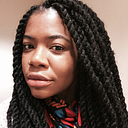Member-only story
I am not a strong Black woman.
Why does everyone expect me to be one?
“You’re so strong, you’ll be alright.”
“Girl, I don’t know how you do it. You’re so strong!”
“I imagine you’re used to getting what you want because you’re so strong.”
These are variations of the commentary I have heard throughout my adulthood and Black womanhood from colleagues, friends, family, and strangers. I am here to say they all could not be more wrong.
Surprise! I am not a strong Black woman. I feel pain. I live in fear. I hurt. I cannot take it all on and survive. Yet, despite the ongoing racial and social injustices Black people experience in America, I am still expected to persevere. To outlast the trauma of police brutality I have always had to live with; the continued injustices of Breonna Taylor, Sandra Bland, Korryn Gaines, Bianca Nikol Roberson, and the countless other Black women, Black trans, and Black men for which this society allows their (police) murderers to walk freely; the lack of safety psychologically at work where I will always experience microaggressions, racism, and sexism because I am the only or one of few, which makes my White and non-Black POC colleagues so uncomfortable — since they never step outside of their privilege and supremacy (or the pandering to such) to consider how I feel about…
